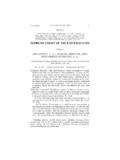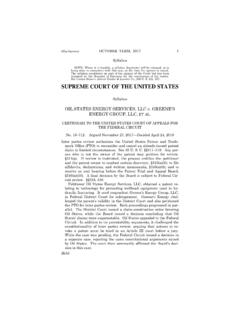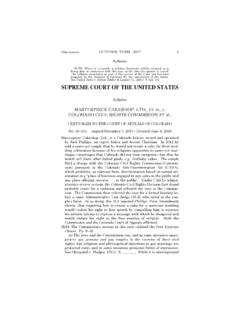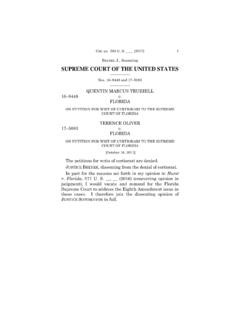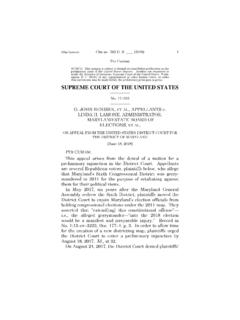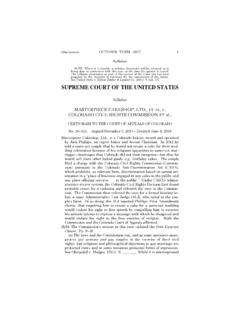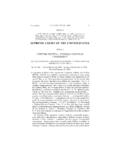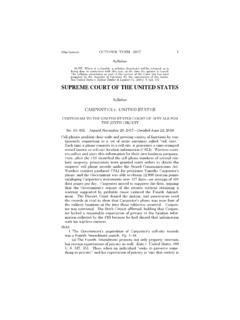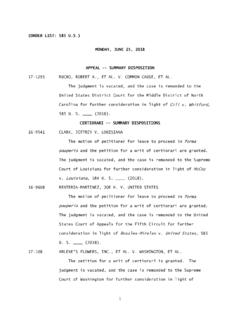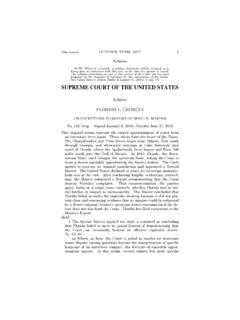Transcription of SUPREME COURT OF THE UNITED STATES
1 1 (Slip Opinion) OCTOBER TERM, 2019 Syllabus NOTE: Where it is feasible, a syllabus (headnote) will be released, as is being done in connection with this case, at the time the opinion is issued. The syllabus constitutes no part of the opinion of the COURT but has been prepared by the Reporter of Decisions for the convenience of the reader. See UNITED STATES v. Detroit Timber & Lumber Co., 200 U. S. 321, 337. SUPREME COURT OF THE UNITED STATES Syllabus McGIRT v.
2 OKLAHOMA CERTIORARI TO THE COURT OF CRIMINAL APPEALS OF OKLAHOMA No. 18 9526. Argued May 11, 2020 Decided July 9, 2020 The Major Crimes Act (MCA) provides that, within the Indian country, [a]ny Indian who commits certain enumerated offenses shall be sub-ject to the same law and penalties as all other persons committing anyof [those] offenses, within the exclusive jurisdiction of the UnitedStates. 18 U. S. C. 1153(a). Indian country includes all landwithin the limits of any Indian reservation under the jurisdiction ofthe UNITED STATES Government.
3 1151. Petitioner Jimcy McGirt wasconvicted by an Oklahoma state COURT of three serious sexual offenses. He unsuccessfully argued in state postconviction proceedings that theState lacked jurisdiction to prosecute him because he is an enrolled member of the Seminole Nation and his crimes took place on the CreekReservation. He seeks a new trial, which, he contends, must take place in federal COURT . Held: For MCA purposes, land reserved for the Creek Nation since the 19th century remains Indian country. Pp. 3 42.(a) Congress established a reservation for the Creek Nation.
4 An 1833 Treaty fixed borders for a permanent home to the whole CreekNation of Indians, 7 Stat. 418, and promised that the UNITED Stateswould grant a patent, in fee simple, to the Creek nation of Indians forthe [assigned] land to continue so long as they shall exist as a nation,and continue to occupy the country hereby assigned to them, id., at 419. The patent formally issued in the early treaties did not refer to the Creek lands as a res-ervation, similar language in treaties from the same era has been held sufficient to create a reservation , see, , Menominee Tribe v.
5 UNITED STATES , 391 U. S. 404, 405, and later Acts of Congress referring to the Creek reservation leave no room for doubt, see, , 17 Stat. 626. In addition, an 1856 Treaty promised that no portion of Creek lands 2 MCGIRT v. OKLAHOMA Syllabus would ever be embraced or included within, or annexed to, any Terri-tory or State, 11 Stat. 700, and that the Creeks would have the un-restricted right of self-government, with full jurisdiction over en-rolled Tribe members and their property, id.
6 , at 704. Pp. 3 6.(b) Congress has since broken more than a few promises to the Tribe. Nevertheless, the Creek reservation persists today. Pp. 6 28. (1) Once a federal reservation is established, only Congress can diminish or disestablish it. Doing so requires a clear expression of con-gressional intent. Pp. 6 8.(2) Oklahoma claims that Congress ended the Creek reservation during the so-called allotment era a period when Congress soughtto pressure many tribes to abandon their communal lifestyles and par-cel their lands into smaller lots owned by individual tribal members.
7 Missing from the allotment-era agreement with the Creek, see 31 Stat. 862 864, however, is any statute evincing anything like the presentand total surrender of all tribal interests in the affected lands. And this COURT has already rejected the argument that allotments automat-ically ended reservations. Pp. 8 13.(3) Oklahoma points to other ways Congress intruded on the Creeks promised right to self-governance during the allotment era, in-cluding abolishing the Creeks tribal courts, 30 Stat. 504 505, and re-quiring Presidential approval for certain tribal ordinances, 31 Stat.
8 872. But these laws fall short of eliminating all tribal interest in thecontested lands. Pp. 13 17.(4) Oklahoma ultimately claims that historical practice and de-mographics are enough by themselves to prove disestablishment. This COURT has consulted contemporaneous usages, customs, and practices to the extent they shed light on the meaning of ambiguous statutory terms, but Oklahoma points to no ambiguous language in any of the relevant statutes that could plausibly be read as an act of cession. Such extratextual considerations are of limited interpretive value, Nebraska v.
9 Parker, 577 U. S. 481, ___, and the least compelling form of evidence, South Dakota v. Yankton Sioux Tribe, 522 U. S. 329, 356. In the end, Oklahoma resorts to the State s long historical practice of prosecuting Indians in state COURT for serious crimes on the contested lands, various statements made during the allotment era, and the speedy and persistent movement of white settlers into the area. But these supply little help with the law s meaning and much potential formischief. Pp. 17 28.(c) In the alternative, Oklahoma contends that Congress never es-tablished a reservation but instead created a dependent Indian com-munity.
10 To hold that the Creek never had a reservation would require willful blindness to the statutory language and a belief that the land 3 Cite as: 591 U. S. ____ (2020) Syllabus patent the Creek received somehow made their tribal sovereignty eas-ier to divest. Congress established a reservation , not a dependent In-dian community, for the Creek Nation. Pp. 28 31.(d) Even assuming that the Creek land is a reservation , Oklahomaargues that the MCA has never applied in eastern Oklahoma. It claims that the Oklahoma Enabling Act, which transferred all non-federal cases pending in the territorial courts to Oklahoma s state courts, made the State s courts the successors to the federal territorial courts sweeping authority to try Indians for crimes committed on res-ervations.
